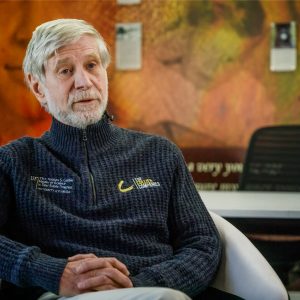Collier Prize Winners 2024
A collaboration among the Texas Tribune, ProPublica and FRONTLINE to report on the tragic mishandling of the active-shooter situation at Robb Elementary School in Uvalde, Texas, on May 24, 2022, received the 2024 Collier Prize for State Government Accountability.

Public Health Watch and several partner organizations won second place for “Toxic Texas Air.” The Democrat & Chronicle of Rochester, New York, was awarded third place for its coverage of the aftermath of the bomb cyclone blizzard in Buffalo, New York, in December 2022.
Now in its fifth year, the Collier Prize, offered by the University of Florida College of Journalism and Communications, drew nearly 100 entries.
The $25,000 prize will be awarded at the White House Correspondents’ Association Dinner on April 27, 2024.
First Place: “Unprepared”
The winning entry included a series of newspaper articles and a FRONTLINE documentary informed by meticulous research to explain why Robb Elementary School students and teachers remained barricaded in a classroom for 77 minutes with the gunman while hundreds of police and federal officers scrambled to find radios, flashbangs, shields and even the key to unlock the classroom, which investigators later surmised might have been open during the entire siege.
For more than a year, Lomi Kriel, an investigative reporter with the Texas Tribune and ProPublica, led a team of reporters who examined video footage from two dozen bodycams and hundreds of hours of investigative interviews with 150 law enforcement officers to untangle the actions — and inactions — that led to the deaths of 21 people, including 19 children.
Reporter Lexi Churchill conducted two 50-state analyses to reach the alarming conclusion that more states require training for children and teachers on how to respond to active shooter situations than they do for the police expected to protect them.
Reporters Jinitzail Hernández, Jessica Priest, Perla Trevizo and Zach Despart also contributed to the series. Juanita Ceballos wrote and directed the FRONTLINE documentary.
“A standout investigation into the missteps of law enforcement during one of the most horrific school shootings in recent U.S. history,” wrote one of the Collier Prize judges. “The accompanying FRONTLINE documentary was especially strong, using officer body-cam footage and recording debriefings with officers to take viewers inside the investigation of what went wrong and why those entrusted to protect children and teachers failed to act until it was too late to save some of the victims.”
Second Place: “Toxic Texas Air”
The second-place winner also is a Texas story. Investigators and reporters from Public Health Watch, the Texas Tribune and five other news organizations took the state to task for polluting the air with deadly and dangerous chemicals, particularly benzene.
The series reporters included Public Health Watch’s David Leffler, Savanna Strott, Salina Arredondo, Jim Morris, Bloomberg News reporter Nazmul Ahasan and independent journalist Jana Cholakovska. Susan White from the Investigative Reporting Workshop edited the series.
Their work included a searing indictment of the state’s environmental regulator, the Texas Commission on Environmental Quality, which knew about but failed to stop high benzene emissions from a chemical storage site in the unincorporated, majority-Latino community of Channelview, Texas, for nearly two decades.
As a direct result of their reporting, nearly 100 people attended a town hall addressing the issue in Channelview. The series of articles is available in Spanish, and the team created an interactive map showing the fine-particle pollution levels in Texas.
One judge wrote, “This project unmasked how Texas weakened environmental standards to protect industry over disadvantaged neighborhoods and created an ever-worsening public health threat. The reporting exposed a pattern of repeatedly loosening regulations when manufacturers exceeded legal limits on emissions.”
Another judge praised the “painstakingly reported series on the willful failure of the Texas Commission on Environmental Quality to protect the health and safety of those living near petrochemical plants. Sweeping reporting.”
Third Place: “Abandoned”
The Democrat and Chronicle of Rochester, New York, part of the USA Today Network, was awarded third place for its coverage of the aftermath of the blizzard that hit Buffalo in December 2022.
The reporters were Matthew Korfhage and David Robinson.
The story of the government’s shortcomings — in preparing for, communicating and responding to the blizzard — is told through the narrative about a young woman named Anndel Taylor, who was trapped and died in her car.
Taylor called 911 five times and finally texted her family that help was on the way. She died in her car, alone. Emergency services were backed up and bottlenecked for days. Taylor was found two days later by a stranger who had read about her on social media. Even after the woman who found her body called officials, no one showed up and the good Samaritan delivered Taylor’s body to the hospital herself.
More than one system failed her and dozens of other New Yorkers who died during one of the worst blizzards in Buffalo’s history.
“This was a wonderfully detailed account of tragedy stemming from a lack of governmental preparedness,” wrote a judge. “The reporters share harrowing details about a stranded motorist and her last hours frustratingly close to first responders who never answered the calls for help.”
Another judge highlighted the “spectacular digital presentation, making the intensity of the storm real and the scope of the emergency management failure all the more tragic.”
Endowing the Future

The Collier Prize is funded by a gift from Nathan S. Collier, chair of The Collier Companies headquartered in Gainesville, Florida, to encourage coverage of state government, focusing on investigative and political reporting. Collier is a descendant of Peter Fenelon Collier, who in 1888 founded Collier’s, a weekly magazine focused on investigative journalism.
Earlier this year, Collier committed an $8 million endowment to UFCJC — the largest in the college’s history — to sustain the Collier Prize, hire a full-time director and create a new local journalism symposium.
